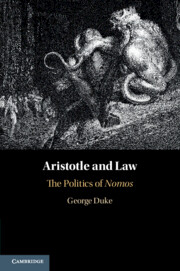Book contents
- Aristotle and Law
- Aristotle and Law
- Copyright page
- Dedication
- Epigraph
- Contents
- Acknowledgements
- Note on the Text
- Abbreviations
- Introduction
- 1 Law As Rational Constraint
- 2 The Legislator
- 3 The Constitutional Relativity of Law
- 4 The Common Advantage and Political Justice
- 5 Stability and Obedience
- 6 Natural Justice and Natural Law
- 7 Equity and the Spoudaios
- Conclusion
- References
- Index
7 - Equity and the Spoudaios
Published online by Cambridge University Press: 28 November 2019
- Aristotle and Law
- Aristotle and Law
- Copyright page
- Dedication
- Epigraph
- Contents
- Acknowledgements
- Note on the Text
- Abbreviations
- Introduction
- 1 Law As Rational Constraint
- 2 The Legislator
- 3 The Constitutional Relativity of Law
- 4 The Common Advantage and Political Justice
- 5 Stability and Obedience
- 6 Natural Justice and Natural Law
- 7 Equity and the Spoudaios
- Conclusion
- References
- Index
Summary
Aristotle’s discussion of equity (epieikeia) is perhaps his most influential contribution to jurisprudence. Like the English doctrine of equity it informed, Aristotelian epieikeia is intended to rectify deficiencies arising from the strict application of the letter of the law to all circumstances. The extension of the concept of the ‘decent’ or equitable into the legal domain might nonetheless seem to undermine some of the most desirable features of the rule of law, including impartiality and predictability. In this final chapter, I argue that Aristotle addresses this concern regarding potential arbitrariness by deriving equitable decisions from the rational content of the legislative expert’s judgments. More generally, while the exemplary ethical agent is a measure of practical reasonableness, it is the content of their judgments which ultimately serves as ‘normative bedrock.’ Section 1 examines Aristotle’s use of equity to balance the universality of the law’s pronouncements with the need for adjudicators to assess particular circumstances. Section 2 then turns to Aristotle’s appeal to the judgments of the exemplary practically reasonable agent as a normative criterion and contends that this need not culminate in arbitrariness or decisionism.
- Type
- Chapter
- Information
- Aristotle and LawThe Politics of <I>Nomos</I>, pp. 149 - 165Publisher: Cambridge University PressPrint publication year: 2019

